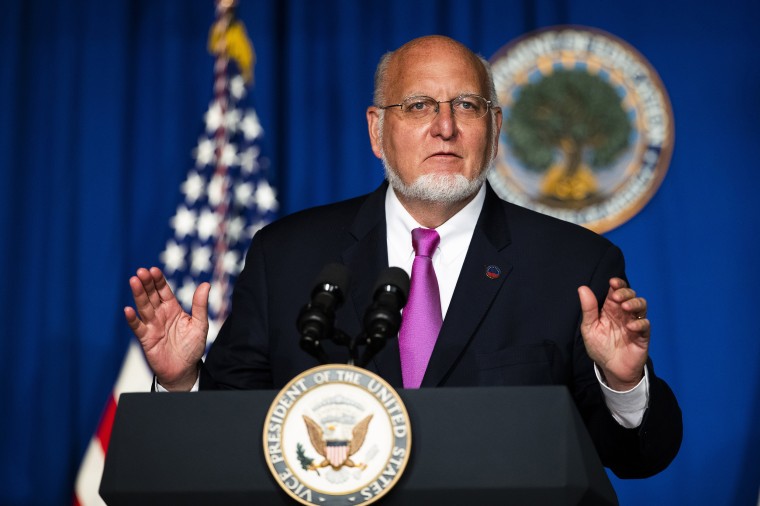As President Donald Trump insists that schools across America reopen, even as new data shows a startling surge of the coronavirus among children and teenagers, the head of the Centers for Disease Control and Prevention said Thursday that returning students to the classroom shouldn't be done hastily.
"We're going to need to do it safely. We're going to need to do it sensibly. And we're going to have to do it based on the unique circumstances, the kinetics of the epidemic and in the areas that the schools are beginning to try to wrestle with this reopening," CDC Director and virologist Robert Redfield told "NBC Nightly News" anchor Lester Holt.
Redfield added that in communities where the virus continues to be transmitted at high rates, districts shouldn't feel pressure from the CDC or the White House to welcome students back without measures in place.
"We don't want to pressure anybody," he said. "Our guidance is there to help them begin to open, as I said, safely and sensibly. The timing of that is going to have to be decided one school at a time."

Redfield's remarks come after he warned Wednesday that this fall could be one of the worst in the United States from a public health perspective because of the return of the flu season. He said the extent of how severe the coronavirus outbreak will become all depends on how Americans abide by CDC guidelines that advise the use of masks, social distancing and hand washing as well as limiting large gatherings.
Trump on Wednesday said he would furnish 125 million reusable masks to school districts, while continuing to push for in-person classes after previously threatening to slash federal funding for those districts that fail to reopen.
He drew criticism last week for saying in an interview that children should return to school because they are "almost immune" or "virtually immune" to the disease. While children make up about 9.1 percent of COVID-19 cases nationwide, according to the American Academy of Pediatrics, they can still transmit the disease to others, and some children have also died from it.
Full coverage of the coronavirus outbreak
"We got to open up," Trump said during a White House briefing. "We got to open up our schools and open up our businesses. And a lot of it has been opened. But we can do better."
Some states remain cautious about blanket reopenings.
California Gov. Gavin Newsom, a Democrat, announced last month that all schools — both public and private — in counties that are on the list for rising coronavirus cases cannot resume face-to-face learning when school restarts, for some districts later this month, and they would have to meet strict criteria before reopening.
A group of parents have since sued Newsom and other officials, demanding that he allow schools to open because their children are "suffering by being deprived" of in-person learning and some are being harmed by a digital divide.
Newsom did not immediately respond to the suit, but has previously said that "students, staff and parents all prefer in-classroom instruction, but only if it can be done safely."
During this crisis, more than 5.2 million people in the U.S. have been infected with the coronavirus, with 167,000 dying from COVID-19, the disease caused by the virus. Worldwide, cases have topped 20 million, with roughly a quarter of deaths occurring in America, NBC News figures show.
The White House on Wednesday released general recommendations for school districts to follow when reopening and to protect "high-risk" teachers, such as "frequent hand washing," minimizing large indoor group gatherings and encouraging the use of masks when social distancing isn't possible.
"We got to do this safely. We got to do this smartly. We got to be flexible," Redfield said. "But I do think it's important that our best interest of society is to work towards getting face to face, you know, learning safely and sensitively based on the unique circumstances of each community."
Download the NBC News app for full coverage of the coronavirus outbreak
Redfield also said parents should "embrace the flu vaccine with confidence" against a looming flu season that will be exacerbated by the highly contagious coronavirus.
"If we choose not to get vaccinated, not to embrace these mitigation strategies, it could be a very difficult time," he added.
Redfield, however, remains hopeful that potential vaccines that have shown promise in early trials will become available by the late fall or early winter.
Moderna Therapeutics, a biotech company in Cambridge, Massachusetts, said last month that it had begun the first phase 3 trial of a COVID-19 vaccine candidate in the United States. The company is partnering with the National Institute of Allergy and Infectious Diseases, which is part of the National Institutes of Health, for its vaccine research.
"I would have never said this back in April or May," Redfield said, "but now I'm cautiously optimistic that we will have a vaccine that will be available before the first of the year."

